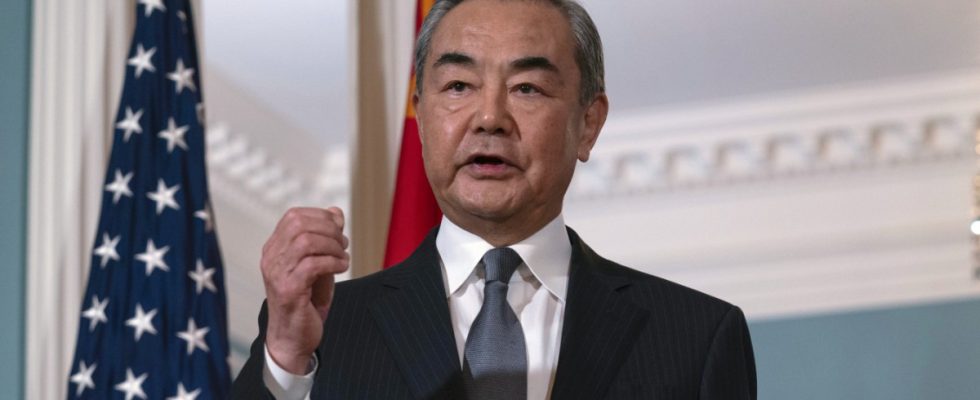Before China’s top diplomat arrived in the United States, the two countries had once again almost collided. On Tuesday, a Chinese fighter jet came within 10 feet, about three meters, of an American bomber in international airspace over the South China Sea B-52. The US Indo-Pacific Command complained that the Chinese plane flew unsafely, unprofessionally and at an uncontrolled speed. China’s Foreign Ministry countered by accusing US military aircraft of wanting to demonstrate their power on China’s doorstep, “which is the main cause of security risks at sea and in the air.” China will “continue to take decisive measures to protect national sovereignty, security and territorial integrity.”
It was in this mood that Foreign Minister Wang Yi arrived in Washington on Thursday. He is the most important guest from Beijing in a long time and his visit is a continuation of efforts to prevent the dispute from escalating further. In June, US Secretary of State Antony Blinken followed up his visit to China and was also received there by President Xi Jinping, not an unimportant gesture. Treasury Secretary Janet Yellen and Commerce Secretary Gina Raimondo were also in China, and National Security Advisor Jake Sullivan met with Wang twice in recent months. Now US President Joe Biden returned the favor despite the latest maneuver and invited the Chinese Foreign Minister to the White House on Friday – the next preparation for an even more important meeting that could take place soon.
First, Wang discussed things twice with his colleague Blinken, including dinner together, and then with the strategist Sullivan. Finally, Xi’s envoy Wang sat in the Roosevelt Room with Biden, who was assisted by Blinken and Sullivan. If nothing else comes between them, then this was the final overture for the meeting between the two heads of state: the Asia-Pacific summit will take place in San Francisco in mid-November, and China’s President Xi is expected to meet host Biden.
The top American and the top Chinese last spoke during the G-20 summit in Bali in November last year, and Xi was last in the USA in 2017. At that time, he honored Donald Trump at Mar-a-Lago, and since then the relationship between the world powers has changed getting worse. Trump imposed billions in tariffs on Chinese goods, followed by disputes over technology, the pandemic, human rights – and, above all, Taiwan.
In August 2022, Nancy Pelosi traveled to the island claimed by China. In September 2022, Joe Biden answered “yes” when asked whether the US would defend Taiwan in the event of a Chinese invasion. His spokesmen immediately reassured him, but the Chinese leadership was still outraged. Then, in early February 2023, the US Air Force shot down a suspected spy balloon off the American coast that had been flying over America for days. Additionally, the ingredients for the opioid fentanyl, which is killing tens of thousands of Americans, mostly come from China.
China complains about the USA: “Provocateur, risk-taker and spoilsport”
And then there are the wars in Ukraine and Israel. Roughly speaking, the USA hopes that China will use its influence in Moscow and also in Tehran to prevent the catastrophe in the Middle East from spreading. On top of that, there are collisions between ships from China and the Philippines, a US ally, and at times near collisions between ships from China and the US. Beijing, for example, released a video showing the destroyer USS Ralph Johnson cruises in front of a Chinese naval ship. China’s Defense Ministry complained that the United States was “the real provocateur, risk-taker and spoilsport.”
But both sides are also trying to smooth things over and stay in touch. There will be a few shrill voices from time to time in China-US relations, Wang said as he stood next to colleague Blinken on Thursday. China is dealing with this calmly, “because we believe that what is right or wrong does not depend on who has the stronger arm or the louder voice.”
The White House sent a short statement after the appointment with Biden. The US President emphasized “that both the United States and China must deal responsibly with competition in their relationships and maintain open lines of communication.” Both must “work together to address global challenges.” Biden also condoled his visitor Wang on the death of former Prime Minister Li Keqiang.
Competition and business yes, direct conflict no, that’s roughly how Biden imagines the relationship with China. Cooperation on global issues such as climate change and artificial intelligence should help keep the issue of Taiwan under control. Biden viewed the meeting with Wang as a “positive development,” assured John Kirby, spokesman for the National Security Council. Biden “fully expects to meet with Xi again. We are confident that this will happen.” The next time will be in California in just over two weeks.

